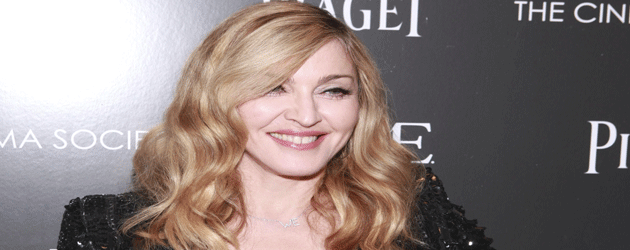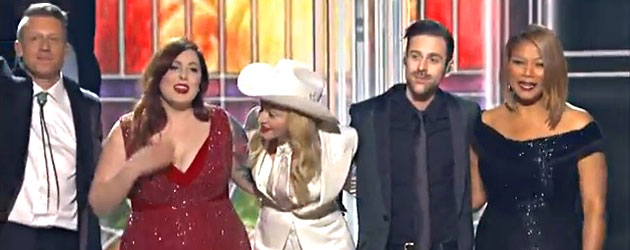By: Chris Azzopardi/TRT Special–
Gay icon relates herself to ‘strong women’ in new film, talks being an outsider and the latest era of her career.
With all of Madonna’s metamorphoses throughout her balls-out career, slipping in and out of cultural zeitgeists (and accents), the queen chameleon is still the master of reinvention. Just don’t tell her that.
“Please don’t throw those tired, old clichés at me,” Madonna playfully insists, nodding her head at me in half-kidding agitation. (Hey, at least it wasn’t hydrangeas.)
Her annoyance is marked with cheekiness – and a smile – that only the First Lady of Pop can pull off, and has for three decades. This is a new chapter in the indelible diva’s run, as she drops her hyped 12th album, MDNA, in March via a three-disc deal with Interscope; plans to launch an extensive world tour; does, perhaps, the gayest Super Bowl halftime ever; and releases her feature-length directorial debut W.E., a pet project that recently won her a Golden Globe for Best Original Song.
And she – sexpot, spiritualist, Material Girl – really only has one word to define herself at the moment: “Busy.” Always unpredictable, she’s not interested in breaking down the details of what’s to come. All she cares to talk about is the film, a semi-biopic on Wallis Simpson (played by Andrea Riseborough) and King Edward VIII dovetailed with a modern-day love story centered on fictionalized damsel-in-distress Wally Winthrop (Abbie Cornish).
Seated with Madonna at a Waldorf-Astoria suite in New York City on a December afternoon, one writer tells her he has a question to kick off the interview. “I’m sure you do,” she quips all-knowingly, as if to acknowledge the fact that she’s aware how much gay men go gaga over her. This is, after all, the room reserved for a small group of gay press, her first stop after a tardy arrival – “It’s all too much. That’s why I’m late! I’m late for everything now.” – and the one her longtime publicist, Liz Rosenberg, insists will put her in a good mood for the rest of the day. Madonna agrees, sighing: “Let’s start with levity.”
Madonna’s in her groove around us. She knows we get her even when she’s wielding snarky cracks. Ask her if she knows how to do the twist like the characters in her film and she responds: “Yes.” Hard pause. “Pretty simple.” Reminisce on when you last interviewed Madonna and she won’t care. “All right, let’s get down to business,” she insists, done with small-talk.
And so we do. Looking stunningly flawless, not at all her 53 years, in a deep blue dress with her now-infamous black gloves and a bracelet of four crosses to represent each one of her children, she gives us exactly what we want: Madonna. No pretense. No filter. No warm-and-fuzzy. In the interview, she talks about the challenges of being a strong woman in a man’s world, teaching her children to be unique and how outsiders can relate to her new film.
Q: What similarities do you see between Wallis and Evita?
A: What they have in common is what many people have in common who are public figures, who become iconic and who have some kind of historical impact, especially women – strong women. People have a tendency to feel intimidated by the strength of these women and in order to accept – actually, the word “accept” is wrong, because I don’t think they’re actually accepted. I think in order to deal with them, a lot of people who write history books, and humanity in general, have a tendency to diminish women or undermine their accomplishments or try to portray them as heretical or as someone with an evil possession of some kind of sorcery, or undermine their strength or intelligence, so I think they have those things in common. Now I’m not saying that Eva Peron is without flaws or that Wallis Simpson was this perfect holy human being, but I do think they were both dealt with in a very unfair way in the history books.
Q: Have you felt that way?
A: (Laughs, expecting the question) Well, yeah, sure. Yes, of course. I mean, I don’t think it’s just me. It’s strong women in general.
Q: Why?
A: Why? Because… (hesitates)
Q: You’re a threat?
A: No. It’s just the nature of the universe. It’s the nature of the world that we live in. We live in a patriarchal society and strong women have to…
Q: Challenge that?
A: No. They’re held under a microscope and judged and measured in a different way. That’s just the law of the universe right now.
Q: The film is driven by a contemporary woman’s view of this historical figure. Do you see anything in your story that may, or that you hope one day may; do the same for someone else?
A: The Duchess is really Wally’s spiritual guide, so to speak, and even though she (the Duchess) came from a different era where women didn’t have the same kind of choices and opportunities, we as women still are all raised on this fairytale idea that no matter how many opportunities we have education-wise or job-wise, your knight in shining armor is going to arrive on his beautiful white stallion and sweep you off your feet and take you off into the twilight, and you’re going to live happily ever after.
This is something that we all have to deal with when we grow up. But one person isn’t going to be all of those things to us; ultimately, we have to make our own happiness, and when we can own that and take responsibility for our own happiness, then we can find a mate for ourselves, or companion or significant other or whatever you want to call it. That’s certainly what the Duchess imparts to Wally, and I hope that I can inspire other women to think that way with my own life and behavior.
Q: What’s the thing that surprised you most about Wallis Simpson while doing your research?
A: The discoveries that Wally makes in her journey and her investigations were essentially mine. When I heard about the story – what a magnanimous, generous romantic gesture Edward VIII made toward Wallis Simpson – I thought the same thing that Wally says when she’s looking in the mirror trying on the necklace: “What must it feel to be loved that much?”
As I started to unravel the story and read the letters and go on the journey that I went on to write the script, I realized that, in fact, it wasn’t this fairytale romance as I had imagined it would be. I found that Wallis Simpson tried to avoid the actual marriage from taking place and how she saw the writing on the wall and how she tried her best to get Edward to see the writing on the wall. She was very astute in her observations, but obviously she couldn’t talk him into her point of view. He was just cunt-struck, as they say in England. (Laughs at her choice of words) Sorry!
Q: Did you ever think of making the movie without the contrasting modern-day story of someone reflecting on a historical figure?
A: No. I wasn’t interested in making a straightforward biopic. I don’t think it’s possible to tell the story of one person from beginning to end in two hours. I think that’s actually an unfair challenge to give oneself. And also, truth is so subjective and each of us could read the same five books about the Duke and Duchess of Windsor and we would walk away with a different interpretation. It would impact us in a different way, and so it was important for me to establish that. As much research as I did, and as close as I tried to stay to the truth and as authentic as I wanted to be, it was important that I be clear that it is a point of view. I never intended to just tell the story of Wallis Simpson.
Q: What’s the importance of telling this story from your point of view?
A: Most of the perspective on the story is, “Look what he gave up for her,” and it’s told from the male point of view. I think that when Wally starts to make all these discoveries about the Duchess, she appeals to Mohamed Al Fayed (keeper of the Duke and Duchess’ letters) as an outsider, because he lives as a foreigner and as an outsider in England, not really accepted by society.
Really, in my movie, each character is an outsider. Wally is living in alienation in the Upper East Side, where she doesn’t fit in; (Wally’s love interest) Evgeni is a Ukrainian immigrant working as a security guard, but he’s really an intellectual and an artist and he doesn’t fit in; the Duchess doesn’t really fit into this aristocratic world that she’s found herself in, and Edward doesn’t really fit into the Victorian world that he was raised in. So it’s how all these people who feel like outsiders try to come to terms and find their way in the world.
Q: Is that something you draw from your own experience?
A: Yeah, but I think a lot of people can relate to it. A lot of us feel like we don’t fit into the conventional norm or what society expects from us. More and more, people are redefining what makes a family, what makes a couple, what makes love, what romance is, what a union is, what soul mates are – all of these things we’re reinventing, because family is what you make it. It’s funny how things turn out that way. Sometimes your parents aren’t really the people who nurture you. You have other role models in your life that become your mother and your father. It’s unusual when the family you’re born into is actually the people that feel like your family.
Q: Growing up, you rebelled against your upbringing and convention, becoming a major trailblazer. How is it different being a mother with kids who will not have to fight the same battles that you fought?
A: Not that this has anything to do with my film, but it’s an interesting question. I don’t think that I’m a conventional parent. I realize that, to a certain extent, my children are raised with privilege; they have housekeepers, I didn’t. There are a lot of differences. On the other hand, my parents raised me in a very conventional way and I rebelled against it, and now my children come to me and they often want to do things because everybody else does them, and I say to them, “That’s just the worst reason I’ve ever heard for doing something.”
I encourage them to question things. Question their behavior, take responsibility for their behavior, think outside the box. And they will have a different set of challenges. They will be compared to me. I will be some kind of a benchmark that they have to live with and deal with, and they are going to have to find their way in the world. We are all born with, and into, our challenges, so I don’t think for a second that life is going to be so simple and easy for them.
Q: Do you feel like all your years of research on Wallis Simpson is over with, or are you still invested in her?
A: I’m done with my deep research, but I still feel a strong connection to her. She’s always going to be a part of me. I am still uncovering little gems about her. People come to me and say, “Oh, look at this little note that we found in this handbag that was auctioned off 20 years ago.” People are still bringing me bits and bobs and memorabilia, so I’m still discovering things about her – and I’m sure I will for the rest of my life.
I was actually going through my papers in my files the other day and found an astrological reading that someone had done for me 30 years ago. I was reading it, and the woman was talking about some aspect of my personality and she quoted Wallis Simpson: “All for love and the world well lost.” I thought, “How weird, she was already a part of my life.” That was a little foreshadowing. That happened 30 years ago, so who knows what’s going to happen 30 years from now.
* Chris Azzopardi is the editor of Q Syndicate, the international LGBT wire service. Reach him via his website at www.chris-azzopardi.com.







